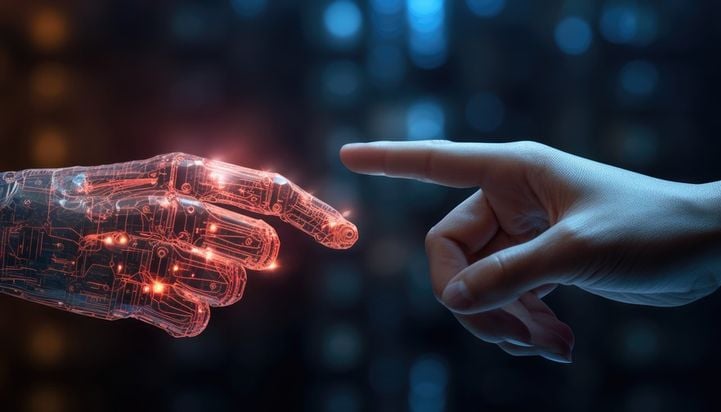The Ethics of AI: A Christian Perspective
What does the Bible say about AI? Explore the ethical dilemmas and the importance of human value in a technologically advanced world.


Alright, let's talk about something that's popping up everywhere these days: Artificial Intelligence, or AI. It's in our phones, our cars, and it feels like it's only going to get bigger. As Christians, it makes you wonder, right? What does our faith have to say about all this tech? What does it mean for us as humans, created in God's image? Let's try to unpack some of that.
The Buzz About AI: What's the Big Deal?
You can't scroll through the news or social media without hearing about AI. From programs that can write code to robots that can perform surgery, it's kind of mind-blowing. People are excited about the possibilities – maybe AI can solve big problems like climate change or disease. But there's also a bit of unease, isn't there? What happens to jobs? What about privacy? And at a deeper level, what does it mean to be human when machines can do so much?
What Makes Us Human? The Image of God
As Christians, we have a foundational belief about what makes us special: we are made in the image of God (Genesis 1:27). This isn't just about how we look; it's about our capacity for love, for reason, for creativity, for spiritual connection. It's about our inherent dignity and worth, given to us by our Creator. This idea is crucial when we start thinking about AI. Can a machine truly possess these qualities? Can it have a soul? Can it have a relationship with God? These are big questions.
The Potential Good: Using AI for God's Purposes
Now, it's not like all technology is bad. Think about how we can use the internet to share the Gospel or how medical advancements can heal the sick. AI could potentially be used for good too. Imagine AI helping to diagnose diseases earlier, or assisting in disaster relief efforts, or even making education more accessible to everyone. If we use this technology in ways that reflect God's love for humanity and his desire for justice and healing, then it could be a powerful tool. As it says in Philippians 4:8, we should think about what is noble, right, pure, lovely, admirable, excellent, and praiseworthy. If AI can contribute to these things, then it has potential.
The Ethical Minefield: Navigating the Challenges
But there are definitely ethical concerns we need to wrestle with as Christians. One big one is bias. AI learns from the data it's fed, and if that data reflects the biases of the people who created it, then the AI will perpetuate those biases. This could lead to unfair or discriminatory outcomes. Another concern is the potential for job displacement. If AI can do many of the tasks humans currently do, what happens to livelihoods? We also need to think about privacy and surveillance. How much of our data are we willing to give up to AI systems? And what about the potential for misuse, like autonomous weapons? These are weighty issues that require careful consideration and a moral compass rooted in our faith.
Human Value in a World with AI: Still Central
Ultimately, as Christians, we need to affirm the inherent value of every human being, regardless of how advanced technology becomes. Our worth isn't tied to our ability to perform tasks that AI can also do. Our value comes from being created in God's image and being loved by Him. Jesus himself emphasized the value of each individual (Matthew 10:31: "So don’t be afraid; you are worth more than many sparrows"). As AI develops, we must ensure that it serves humanity and enhances human flourishing, rather than diminishing our dignity or worth. Our focus should always be on loving God and loving our neighbor (Matthew 22:37-39), and that should guide how we develop and use AI.
Moving Forward with Wisdom and Discernment
So, what's the takeaway? AI isn't inherently good or bad; it's a tool, and like any tool, it can be used for good or for ill. As Christians, we need to engage with this technology thoughtfully, guided by our faith and our understanding of human value. We need to ask the tough ethical questions, advocate for responsible development, and ensure that AI serves humanity in a way that honors God and reflects His love for all creation. It's a complex journey, but one we need to walk with wisdom and discernment, always keeping our eyes on what truly matters in God's kingdom.
Frequently asked questions
What is the main Christian perspective on AI discussed in the article?
The article emphasizes viewing AI through the lens of humanity being created in God's image and the inherent value that entails.
Does the article suggest AI is inherently good or bad from a Christian viewpoint?
No, it suggests AI is a tool that can be used for good or ill, depending on how it's developed and applied.
Does the article see any potential benefits of AI from a Christian perspective?
Yes, it suggests AI could be used for good in areas like healthcare, disaster relief, and education, aligning with God's desire for justice and healing.
How does the concept of the "image of God" relate to discussions about AI?
It highlights the unique human capacities for love, reason, creativity, and spiritual connection, raising questions about whether AI can possess these.
What is the article's concluding thought on how Christians should approach AI?
Christians should engage with AI thoughtfully, guided by their faith and understanding of human value, advocating for responsible development and use.
What are some ethical concerns about AI raised in the article from a Christian standpoint?
Bias in AI, potential job displacement, privacy issues, and the possibility of misuse are some key concerns.
